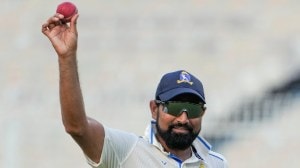The State Autonomy Report 8212; the political Bible of the National Conference which was released a few months ago 8212; is once again the focus of Kashmir politics. The provocation is the forthcoming parliamentary polls, with a little help from the memory of Kargil. Opinion is fast growing that to sustain the recent diplomatic successes on the Kargil issue, there is a need to take steps 8220;to address the grievances of the people of the state without bartering the sovereignty of the country.8221; The NC has to face the people who had voted them to power in the previous election solely on the promise of the restoration of autonomy.
If the recommendations of this report are implemented, the Centre will have no role in the affairs of the state apart from defence, external affairs and communications. The state will have its own Prime Minister and Sadr-e-Riyasat state President, though it will remain a part of the Indian Union. All India service officers will then not be posted to the state and Jammu and Kashmir willraise its own cadres.

With 13 major recommendations for the repeal of all orders that are not in conformity with the Constitution Application to Jammu and Kashmir Order, 1950, and the terms of the Delhi agreement of 1952, the report has already been tabled in the state Assembly.
With cautious safeguards for the future, the Autonomy Report categorically suggests a fresh accord between the state and the Union, 8220;to restore the unconstitutionally eroded autonomy of the state and to remove the debris of an unhappy past and build a new relationship reflecting mutual trust and respect8221; between Srinagar and New Delhi.
Attributing the prevailing crisis to the 8220;mess created by the 40 years of unconstitutional practices8221;, the report asks for an immediate restoration of the pre-1953 position of the state within the Union, 8220;if popular sentiment is to be respected and resentments assuaged.8221;
8220;To put a seal on the record of the past,8221; the report suggests the invocation of Article 258 of the Constitution forentrusting to the state 8220;functions in relation to any matter to which the executive power of the Union extends.8221; The report claims that the situation has deteriorated to the extent that Article 370 has acquired a dangerously ambiguous aspect. 8220;Designed to protect the state8217;s autonomy, it has been used systematically to destroy it.8221;
A senior Cabinet minister who played a vital role in framing the document said, 8220;We hope all political leaders at the national level will stand above party politics and help to fulfil our genuine demand of the restoration of our lost autonomy and show respect to the aspirations of the people of the state as well as to the basic spirit of our accession to the Indian Union.8221;
Story continues below this ad
8220;If they the Centre are serious in saving Kashmir, this is perhaps the last chance. We were elected with a two-thirds majority on the autonomy plank. If this popular sentiment of the people is betrayed again, it will prove to be the final blow,8221; he said. 8220;The post-Kargil scenario has provided theCentre with a golden opportunity to solve this problem once and for all, that too without bartering the sovereignty of the country. The demand is of restoration of autonomy, not secession.8221;
On the other hand, National Conference president and Chief Minister Farooq Abdullah is also under severe pressure from within the party. And as arch-rival Congress in Kashmir talks in a louder regional tone, the restoration of autonomy has become a prestige point for the party, whose regional character is at stake. The Lok Sabha election also makes it imperative to play the autonomy trump card, which brought the party to power.
There is, however, scepticism in both academic and political circles in the Valley regarding the actual implementation of the report8217;s recommendations and restoration of the pre-1953 status to Jamp;K. 8220;No party in power at the Centre can ever put its whole political future at stake by restoring autonomy to the state. It also needs a consensus among national political parties. And keeping in viewthe political scene in Delhi, it is highly unlikely to happen even in the next few decades,8221; said Gul Mohammad Wani, who teaches Political Science at Kashmir University and has worked extensively on Centre-state relations.
8220;Nothing will happen even if the Assembly, with a two-third majority for the NC, passes the report. What happened to the Jamp;K Resettlement Bill? The Assembly passed it and later it was sent for constitutional verification in the early eighties, never to return,8221; he said.
Story continues below this ad
Wani said there is a virtual consensus that the trouble in Kashmir has its origins in the toppling of Sheikh Mohammad Abdullah8217;s government in 1953 and his subsequent arrest. The resentment within the Kashmiris has its roots in this first attempt to erode the special status of the State.
8220;Though practically a distant dream, if at all the NC manages to restore autonomy, it will be the best acceptable solution short of Azadi and will also provide a permanent constitutional relationship between Srinagar andDelhi.8221;
The State Autonomy Report goes: 8220;The Instrument of Accession, that was the very basis of the state8217;s relationship with the Union, conceded powers of legislation to the federal Union in defence, external affairs and communications. Every other subject should be brought back under State8217;s ambit.8221;
Interestingly, the Instrument itself specified matters in the 8220;schedule8221; in which the Dominion legislature could make laws for Jamp;K. There were 20 such, grouped in defence, external affairs, communications and ancillary. However, according to the report, the changes from 1954 onwards, particularly in the sixties, were so rapid that things changed beyond recognition. 8220;Encroachment on the state8217;s jurisdiction was obvious, thereby reducing the state8217;s autonomy to a mockery. Thus the committee recommends that all the matters in the Union list not connected with defence, external affairs, communications and ancillary thereto but made applicable should be excluded from their application to the state.8221;
Story continues below this ad
Inthis connection, the report recommends the omission of Articles 248, 249, 250, 251, 262 and 263 besides all modifications made in Article 246 of the Indian Constitution in its application to the state after 1950. Also, the application of Article 254 in the same status as in 1954, besides a halt in the application of a part of the Seventh Schedule.
The report also recommends non-application of fundamental rights to the state; it prefers a separate chapter on fundamental rights in the Jammu and Kashmir Constitution. Though the report does not dispute the extension of jurisdiction of the Supreme Court over the State, it suggests settlement of the issue of the Delhi Agreement of 1952, especially since quick decisions were forced upon the 8220;flawed8221; Constituent Assembly after the 1953 crisis.
Calling the addition of Clause 4 to Article 368 of the Constitution of India an 8220;uncalled-for clog8221; on the constituent powers of the State Legislature, the report recommends: 8220;remove it lock, stock andbarrel8221;.
According to this Clause, introduced through Constitution Application to Jamp;K Second Amendment Order, 1975, the state Legislature cannot make any amendments in its own Constitution besides changes in appointment, powers, functions, duties, emoluments, allowances, privileges or immunities of the Governor. It also restricts the state Legislature from making any changes relating to the election machinery and the composition of the Legislative Council.
Story continues below this ad
Another very important recommendation is the omission of 8220;including the state of Jamp;K8221; from Article 312 of the Constitution of India, which means the All India Services will cease to reach the state.
8220;Ever since the application of these provisions of the Indian Constitution to our state, the number of direct recruits from the state has been negligible,8221; the report says and claims that 8220;no imperial model of civil services in central cadre could be a substitute for what the local youth could be expected to have i.e. local patriotic feeling andpassionate attachment.8221;
Interestingly, the report is silent on the issue of financial autonomy.8220;It may be recalled that during the 1952 Delhi talks, the discussion on financial arrangement between the Union and state remained inconclusive,8221; the report says and recommends that the matter be discussed in depth between the state representatives and the Union Government.
































